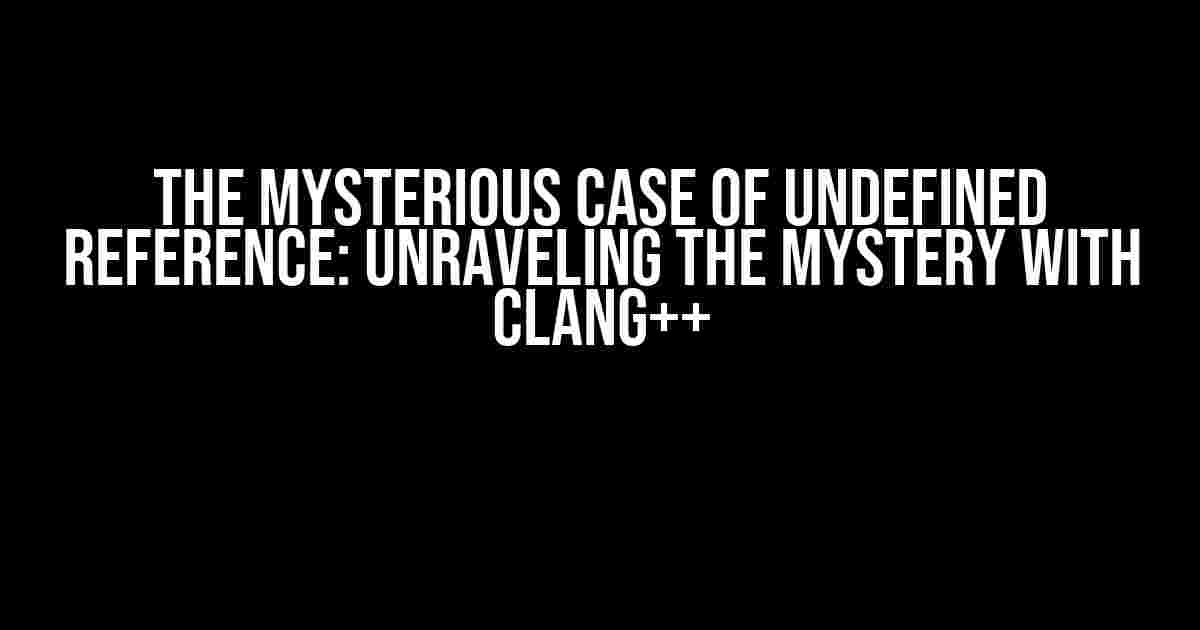If you’re a C++ developer, chances are you’ve stumbled upon the infamous “undefined reference” error at least once in your coding journey. It’s like stumbling upon a hidden door in a dark forest, only to find that the door leads to a labyrinth of confusing error messages. Fear not, brave coder, for we’ll embark on a quest to vanquish this beast and emerge victorious with the help of Clang++.
The Error of Errors: Understanding Undefined Reference
An undefined reference error occurs when the linker (ld) is unable to find the definition of a symbol (function or variable) in the object files. This can happen due to various reasons, such as:
- Missing or incorrect library linking
- Typo in function or variable names
- Incorrect ordering of object files
- Duplicate symbol definitions
- Missing or incorrect extern keywords
The error message usually looks something like this:
undefined reference to `myFunction' collect2: error: ld returned 1 exit status
Don’t worry; we’ll tackle each of these potential culprits one by one.
Tooling Up: Configuring Clang++ for Success
Before we dive into the fray, let’s make sure we have the right tools for the job. Clang++ is a popular C++ compiler that’s known for its excellent error messages and robust features. Here’s how to configure Clang++ for our quest:
clang++ -std=c++11 -Wall -pedantic -o myprogram myprogram.cpp
This command tells Clang++ to:
- Compile the code with C++11 standards
- Enable all warnings (-Wall)
- Enforce pedantic warning levels (-pedantic)
- Output the executable to myprogram
- Compile the myprogram.cpp file
Tracking Down the Culprit: Common Causes of Undefined Reference
Now that we have our trusty Clang++ compiler, let’s investigate the most common causes of undefined reference errors:
Mismatched Function or Variable Names
A single typo can lead to an undefined reference error. Make sure to double-check your function and variable names for any discrepancies:
// myprogram.cpp
void myFunction() {
// code
}
// main.cpp
int main() {
myFuntion(); // typo!
return 0;
}
In this example, the function name is misspelled in the main.cpp file, leading to an undefined reference error.
Incorrect Library Linking
When using external libraries, you need to link them correctly to avoid undefined reference errors. Here’s an example with the popular mathematics library, libm:
clang++ -std=c++11 -Wall -pedantic -o myprogram myprogram.cpp -lm
In this case, we need to link the libm library using the -lm flag.
Incorrect Ordering of Object Files
The ordering of object files can also cause undefined reference errors. Make sure to compile and link object files in the correct order:
clang++ -std=c++11 -Wall -pedantic -c myprogram.cpp -o myprogram.o clang++ -std=c++11 -Wall -pedantic -c utility.cpp -o utility.o clang++ -std=c++11 -Wall -pedantic -o myprogram myprogram.o utility.o
In this example, we compile myprogram.cpp and utility.cpp separately and then link them in the correct order.
Duplicate Symbol Definitions
Duplicate symbol definitions can lead to undefined reference errors. Here’s an example:
// myprogram.cpp
void myFunction() {
// code
}
// utility.cpp
void myFunction() {
// code
}
In this case, both myprogram.cpp and utility.cpp define the same function, myFunction. To fix this, we can use extern keywords to declare the function in one file and define it in another:
// myprogram.cpp
extern void myFunction();
int main() {
myFunction();
return 0;
}
// utility.cpp
void myFunction() {
// code
}
By declaring the function in myprogram.cpp and defining it in utility.cpp, we avoid duplicate symbol definitions.
Mastering the Art of Debugging: Tips and Tricks
Debugging undefined reference errors can be a daunting task, but with the right strategies, you’ll become a master detective:
- Read the error message carefully: The error message often provides valuable clues about the nature of the problem.
- Use the -v flag: The -v flag enables verbose mode, which can provide additional information about the compilation and linking process.
- Check for typos: A single typo can lead to an undefined reference error.
- Verify library linking: Make sure you’re linking the correct libraries in the correct order.
- Use nm and objdump: These tools can help you inspect object files and libraries for symbol definitions.
Conclusion: Triumph Over Undefined Reference
With Clang++ as our trusted sidekick, we’ve conquered the realm of undefined reference errors. Remember to:
- Double-check function and variable names for typos
- Link libraries correctly and in the correct order
- Avoid duplicate symbol definitions
- Master the art of debugging with verbose mode and inspection tools
By following these guidelines, you’ll be well on your way to becoming a C++ wizard, effortlessly slaying the dragons of undefined reference errors. Happy coding!
| Common Causes of Undefined Reference | Solution |
|---|---|
| Mismatched function or variable names | Double-check function and variable names for typos |
| Incorrect library linking | Link libraries correctly and in the correct order |
| Incorrect ordering of object files | Compile and link object files in the correct order |
| Duplicate symbol definitions | Avoid duplicate symbol definitions using extern keywords |
Remember, with great power comes great responsibility. Use your newfound knowledge wisely, and may the code be with you!
Frequently Asked Question
Are you tired of dealing with “Undefined reference” errors when using Clang++? Don’t worry, you’re not alone! Here are some frequently asked questions and answers to help you troubleshoot and resolve those pesky errors.
Q1: What is an “Undefined reference” error, and why does it occur when using Clang++?
An “Undefined reference” error occurs when the linker can’t find the definition of a function or variable that’s been declared but not defined. This can happen when you’re using Clang++ because it’s a more strict compiler than GCC, and it requires explicit definitions for all symbols. Make sure you’ve defined the function or variable, and that it’s reachable from the file where it’s being used.
Q2: How do I fix an “Undefined reference” error when using a library with Clang++?
When using a library with Clang++, make sure you’re linking against the correct library file (e.g., libmylib.a or libmylib.so). Check that the library file is in the correct location, and that you’re specifying the correct linker flags (e.g., -lmylib). You can also try using the -v flag to get more verbose output from the linker, which can help you identify the issue.
Q3: Why am I getting an “Undefined reference” error for a function that’s clearly defined in my code?
Check that the function is defined in the correct scope and namespace. Clang++ can be picky about these things! Also, make sure you’re not using inline functions or templates in a way that’s confusing the compiler. Try breaking down the code into smaller pieces to isolate the issue.
Q4: How do I troubleshoot an “Undefined reference” error when using Clang++ with a Makefile?
When using Clang++ with a Makefile, try running make with the -n flag to get a dry run of the build process. This can help you identify the command that’s causing the error. You can also try adding the -v flag to get more verbose output from the compiler and linker.
Q5: Are there any tools or plugins that can help me resolve “Undefined reference” errors with Clang++?
Yes, there are several tools and plugins that can help! For example, you can use the Clang++ -fdiagnostics-color flag to get colorful error messages that can help you identify the issue. You can also try using plugins like clang-tidy or include-what-you-use to catch errors and improve code quality. Additionally, tools like cppdepend or doxygen can help you visualize your code dependencies and identify potential issues.


